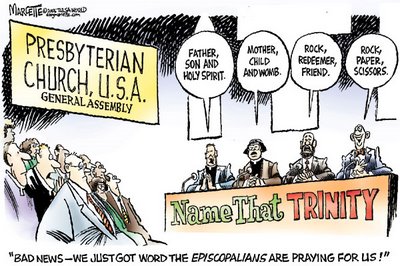 Why is the doctrine of the Trinity so crucial to Christianity? After all, not many understand it, most attempts to explain it stray into either the heresy of modalism or that of tri-theism, and the very concept arose in a time of strange Greek-dominated philosophy. What value does the Trinity have today and what relevance can it demonstrate in a postmodern environment?
Why is the doctrine of the Trinity so crucial to Christianity? After all, not many understand it, most attempts to explain it stray into either the heresy of modalism or that of tri-theism, and the very concept arose in a time of strange Greek-dominated philosophy. What value does the Trinity have today and what relevance can it demonstrate in a postmodern environment?"The doctrine of the Trinity is what basically distinguishes the Christian doctrine of God as Christian, and therefore what already distinguishes the Christian concept of revelation as Christian, in contrast to other possible doctrines of God or concepts of revelation" (Karl Barth)
When the story broke about the most recent General Assembly of the Presbyterian Church (USA), my wise and witty wife, Jeanette, heard the words, "Mother, Child, and Womb," and immediately responded with the line: "What's next, "rock, paper, scissors?" It was interesting to see veteran political cartonist Marlette, come to the same conclusion.
American Baptist Carl F.H. Henry rightly observed that our contemporary problems with the traditional formulation of the Trinity grows out of a deeper problem: "By its disbelief a large segment of Protestant theology severed the doctrine of the Trinity from the realm of devotion and socio-ethical and spiritual implications, and pigeonholed it as speculation and conjecture."
Bringing the elevated doctrine into the realm of the real world can be found in the combination of thorough systematic theology with pastoral warmth and devotional application in a Brakel's classic, The Christian's Reasonable Service. He puts the ongoing value of believing and proclaiming the Trinity in the most practical of terms:
Behold, must you not admit that faith in the Holy Trinity is profitable? Is it not the only foundation of a truly godly life and the fountain of all comfort? Therefore, consider God as being one in essence and existing in three Persons. Take notice of the operation of each Person in the administration of the covenant of grace, especially as it occurs within you.
If you may entertain appropriate thoughts, make appropriate comments, and have appropriate exercises concerning each Person of the Trinity, you will experience considerable and consistent progress in godliness. There will be a wondrous illumination concerning the unity of the Godhead as you consider each individual Person, and of the Godhead in its Trinity as you contemplate its unity.
If so much light, comfort, joy, and holiness may be derived from perceiving what is but an obscure glimmer of the Trinity, what will it be and how will the soul be affected when he may behold God’s face in righteousness, and awake, satisfied with His likeness? (Ps. 17:15). Then they will walk by sight (2 Cor. 5:7), and they will see Him as He is (1 John 3:2). Therefore, “Blessed is that nation whose God is the LORD; and the people whom He hath chosen for His own inheritance” (Ps. 33:12).
In the face of such vital importance, revisionistic attempts at reconceiving God as "Mother, Child, and Womb" go beyond the trendy to entail a virtually new religion from orthodox Christianity. In such a world, why not go all the way to "rock, paper, scissors"?
[His Barking Dog doesn't claim to know much. However, I agree with Francis Schaeffer that "If I am living in a real relationship with the Trinity, my human relationships become more important in one way, because I see the real value of man, but less important in another way, because I do not need to be God in these relationships any longer." My musings are not only NOT godlike, but unconnected to any persons, authorities, or powers in southern California. I do, however, want to credit Jesuit Spy http://deadtheologiansclub.blogspot.com/ with the idea for this post]

No comments:
Post a Comment